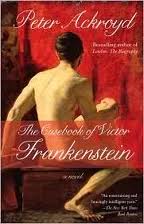Not long ago the subject of Frankenstein came up at a family gathering. I don't remember what got us started, but it occurred to me that my son had seen Young Frankenstein (1974, Directed by Mel Brooks, starring Gene Wilder, Peter Boyle, Madeline Kahn, Marty Feldman, Terri Garr, Cloris Leachman, and Kenneth Mars) and thought it funny, but never seen the original films that Young Frankenstein spoofed. Turns out my mother had never seen them either. So, we rented Frankenstein (1931, Directed by James Whale, starring Boris Karloff, Colin Clive, Mae Clark, and Edward Van Sloan) and The Bride of Frankenstein (1935, Directed by James Whale, starring Boris Karloff, Colin Clive, Valery Hobson, Ernest Thesiger, and Elsa Lanchester) and then watched Young Frankenstein again, having something of a Frankenstein Fest in the course of a few nights.
It had been a long time since I'd seen either of the original films. It's funny how memory works: I see now that much of what Young Frankenstein makes fun of (and what I remember about the original films) is in The Bride of Frankenstein, rather than the first film. I've always thought (and would still say) the later film is the better of the two (partly because sound technology advanced a great deal in the four years from 1931 to 1935), but both have held up rather well. Director Whale and Karloff succeed in making the monster a sympathetic character--as I'm surely not the first to note. It's no excuse to lament being brought into the world against one's will--each one of us is born into the world without a say in the matter--but the misunderstood creature is mercilessly goaded; it's easy to see both that he is done in by his own character faults and that he's not really to blame for what he does. Is it going too far to call the story Shakespearean? I've never read the original story by Mary Shelley. I think the time has come. Clearly, she captured something elemental, something that continues to fascinate after nearly 200 years (the story was first published in 1818).
Peter Ackroyd's entertaining retelling comes at events from a new perspective--that of Victor Frankenstein himself--and ends with a sharp twist on the final page of the book, a twist I won't spoil. In this retelling (The Casebook of Victor Frankenstein, by Peter Ackroyd, 2008, Anchor Books), Frankenstein forms a friendship with Percy Bysshe Shelley at Oxford that serves to spur his experiments in the reanimation of dead tissue, experiments that inevitably escalate into an obsession. We witness at first hand the birth of the creature, its escape, and the revenge it takes upon its creator and the people he cares for--all narrated in what seems a period-perfect voice, as if Frankenstein is reading from his casebook. The matter-of-fact report that takes us through the process of the creation is deliciously ghoulish and in places truly horrifying in a way that the films never capture. A fast-paced, page-turner with depth. This one's very likely to get your electrical fluids going. Recommended.
We watched the films not long before my last birthday. My mother kindly thought to get me this book as a birthday gift. The timing was perfect.
Subscribe to:
Post Comments (Atom)






No comments:
Post a Comment